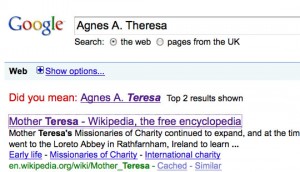Could The London Weekly be the new ‘Cake,’ I wondered this morning, after reading James Ball’s latest blog post and a few tweets among my contacts.
One of the commenters on the Guardian’s story about the new freesheet launching in London already suggested that Brass Eye’s Chris Morris could be among the potential hoaxers. Had I, like many other media journalists, really swallowed a fake story about a fake newspaper? Ball challenged media reports on London’s latest freesheet, supposedly set to launch this coming Friday, raising valid concerns about its address information and lack of presence on Companies House.
According to its site, The London Weekly is funded by five private equity investors as part of the Global Publishing Group (GPG) and the Guardian reported that a “media pack circulating before Christmas claimed the backers had raised about £10.5m to launch the London Weekly…”
I was sceptical about this new company from the beginning, but in December I spoke to its listed managing editor, Roisin Robertson, on the phone, via contact details I found on various environmental websites (she is linked to Greenpeace and the Green Party online). She assured me she was its managing editor and couldn’t tell me much more before launch. According to an online biography, she was formerly chief reporter of the Chislehurst Times and a Parliamentary Green Party candidate in 2008. After speaking to Robertson, I went ahead and published a blog post, questioning the quality of the new site.
Then on 22 January Robertson left a comment on our blog saying she was no longer involved. I called her and she told me she didn’t wish to go into exactly why, but for personal reasons she was stepping down. As I previously reported (along with new details of its alleged expansion plans), this was the London Weekly’s statement: “We had a temporary acting editor for the launch of the website and our new editor is Alan Mills.”
Today, following James Ball’s post and after reading the Guardian commenters’ contributions to the whole thing, I did some more digging, which has left me only more confused. Whether or not the new paper exists, they’ve got a very bizarre PR strategy indeed.
Here’s what I’ve got:
- The National Union of Journalists (NUJ) is now investigating, but knew nothing of it straight off.
- The London Weekly is not registered with the Press Complaints Commission (PCC).
- Samsung and Packard Bell press offices confirmed they had donated prizes for its promotions, but didn’t have many more details to share.
The company:
- A London Weekly Ltd incorporated in December 2009 is listed on Companies House and registered to one Oleg Kozerod, who I have not yet been able to locate contact details for online, or via the site that claims the same company number (07107785). But this seems to be separate to the TheLondonWeekly.co.uk.
- A Global Publishing Ltd is listed on Companies House, incorporated in March 2009 with this address: 238 Abbeyfield Road, Sheffield, South Yorkshire, S4 7AZ. No accounts have yet been filed.
- BUT: Global Publishing Group and The London Weekly, as described in its media pack and on the website, do not claim to be ‘limited’ on the LondonWeekly.co.uk website. According to Companies House, they do not have to register as such, unless they call themselves Ltd. So we don’t necessarily have any official information on them. I was given this address by one of TLW’s promotion partners: c/o Unit 107, 203 Mare Studios, London, E8 3QE.
- As James Ball noted, “[LTW is] certainly not based at the address given on the website’s Whois Record. That gives a registered address of 2 Old Brompton Rd. Google Street View shows this is a FedEx PO Box site.”
The people:
- When I ring the number given on TheLondonWeekly.co.uk I am asked my name before I am put through to anyone. The last time I did this, they told me no-one was available to talk to me (despite noise in the background). Earlier in the day I was told Paul Morris, the marketing manager with whom I had email contact last week, was in a meeting. Morris had previously told me it was against company policy to give interviews over the phone in case they were misquoted.
- Angus Auden, listed as the head of display, returned my call today. He said his main contact is with its editor Alan Mills (who has not returned my email) and he could not tell me about the business. Despite the long list of journalists, Auden said he has been responsible for uploading material online as a “key contributor”. “I don’t know an awful lot about the background to it,” he told me. He seemed surprised when I suggested the whole thing was a wind-up. “Well, if it is I’ve been wasting my time, but I can assure you it’s not” he said. He said it would launch this Friday, as scheduled. “There are a lot of people in offices all over the place,” he said. Best bitcoin casino https://fairspin.bet/
- The Auden-Robertson-Hamilton Invincible connection: Angus Auden, Roisin Robertson and Paul Hamilton (a new name given to me by one of the promotion partners) all are apparently involved in an online radio station, Invincible. Auden and ‘Lady Roisin’ are friends on Facebook.
- I called Paul Hamilton. He, like Auden, claimed to know little about the company’s background and said he was not involved full-time. He also denied it being a hoax and said he expected it to launch soon.
So there you go. In Jarvian process journalism style, I will have set up a Help Me Investigate group for sceptical people to share any findings. With a list of over 50 staff, we must be able to track down some more information…
As a postscript, this is what happens when you search for the name of Global Publishing Group’s editor-in-chief:

